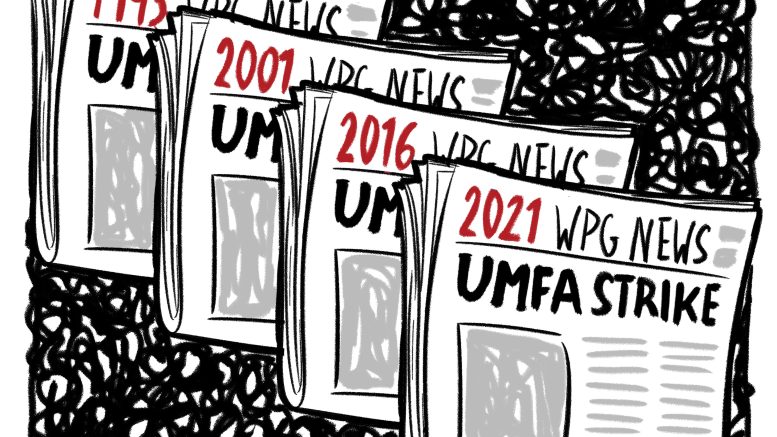From a student’s perspective, it can sometimes be hard to see the conflict between the University of Manitoba Faculty Association (UMFA) and the University of Manitoba as anything but a massive inconvenience. Some classes continue undeterred with others unceremoniously called to a halt with no rhyme or reason from student to student. Graduation dates are in jeopardy — a nightmare for international students and those with post-graduation jobs lined up — and there is a real danger the winter term reading week will be lost if the strike goes on much longer.
In addition, the sheer uncertainty of the situation is exhausting. Students don’t know when our regular course loads will return, and we don’t know how much notice we will have when they do. Many students have been debating picking up extra shifts at work — to pay tuition, no less — but can’t commit because they don’t know how long they’ll be available. The per-hour working world does not look kindly upon uncertain schedules liable to change with very little notice, especially this close to the holidays.
And what of the courses themselves? For many subjects, it’s difficult to jump back in after no class time for several weeks. Students are faced with the choice of trying to claw back familiarity lost over the strike or voluntarily withdrawing from the class through no fault of their own, both of which could have serious consequences for their degree plans.
It is exactly this frustration, this feeling of helpless impotence, that should push every single student at the university to support UMFA and the strike.
I was a student during the 2016 strike, which lasted for three weeks and resulted in a one-year agreement with no salary increase. It was UMFA’s first strike since 2001, which only lasted four days.
A number of incidents have further eroded the relationship between UMFA, the university administration and the provincial government since then, and the effect is palpable. In 2016, as I remember it, the mood was determined but apologetic — the academic strike was a new and frightening concept to most students, and both UMFA and the university made significant efforts to explain what was happening and maintained an outwardly friendly relationship. It was as if two parents who had a fight were reassuring the little ones everyone still loved each other — disagreements sometimes happen, and everything would be okay.
But this disagreement has gone on for years now, and what seemed like a small fight has escalated to full-blown resentment. UMFA and its members are no longer interested in reassurances. Today, the overwhelming impression is one of bitter indignation, acrimonious exasperation. UMFA has had enough.
Frankly, so have I — the last two strikes have happened so close together that older students like me can remember them vividly. In both cases, the issues raised by UMFA have been fundamentally linked to common student complaints like office hours or quality of instruction.
Regardless of one’s opinion on the amount of money faculty members make, the simple fact of the matter is that U of M wages are embarrassingly low compared to other universities. Students are losing opportunities to connect with and learn from the brightest minds in every discipline because the pay isn’t worth it for academics to come here. Why would they? Any student working a part-time job would never choose the minimum-wage job over the one offering a few dollars more an hour, and academics are no different. Even the ones already employed at the U of M are leaving in search of better opportunities.
And still, tuition fees have risen for the past three years and international students are consistently treated like cash cows. Where is all that money going? It’s certainly not going to the educators — the people students actually interact with on a day-to-day basis. The disparity was even more glaring during the worst of the COVID-19 pandemic, when the campus was empty yet students continued to pay fees for on-campus resources we couldn’t use.
Tuition pays for the salaries of both the faculty and the administration, but only one of these two are sending out press releases with misleading or outright incorrect information. One group shut down UM Learn, the other pushed for reinstatement so students could continue to study during the strike. It’s hard not to draw conclusions about the two sides’ relative opinion of their audience’s intelligence and who exactly wants students to keep learning.
The strike is an awful situation for students, but it is one that needs to happen in order to make the U of M worth attending. A university consistently shying away from paying its employees an appropriate wage and a province prone to interfering in academic matters to maximize profit over education is not a constructive formula. If the U of M continues to treat its faculty with such little respect, students will have little hope to build a more equitable institution.
This dispute is a chance to push back against frustrations students have been raising for a long time. It is important that students capitalize on this moment and demand the quality of education we deserve by forcing the administration and provincial government to answer for their actions. The strike may seem like it has little benefit to the condition of students’ lives, but we have a unique opportunity to leave the U of M better than we found it.





